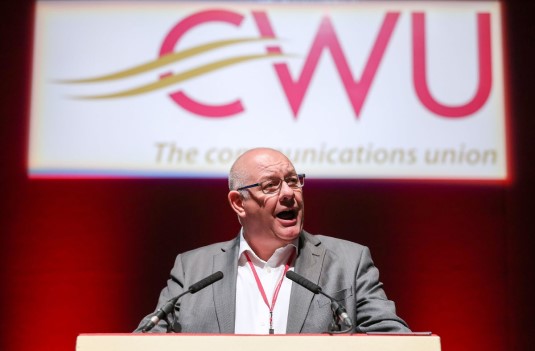CWU Conference Pulls Labour Funding

Which brings us to the result of the Communication Workers Union special conference, which took place this Sunday. Its decision notes the distance between Labour and working class aspirations that have opened up under Keir Starmer, and resolves to cut union funding outside of affiliation fees while reserving the right to support candidates, local politicians, and MPs who remain committed to the CWU's objectives. Interestingly, and rightly, this move marks a conscious effort at politicising the union further by developing its own candidates' programme for CWU members and build networks of branch level political officers to push the union and the interests it stands for at community level. As general secretary Dave Ward put it, "less money and support to Westminster Labour. More to Labour MPs, Mayors, Councillors and candidates who have our members' backs."
What a curious pickle Starmer has got Labour into. We have a situation where he's bent the party backwards to attract the rich donors by refusing to commit to anything but the barest minimum, yet is relaxed about spurning the potentially much greater sums offered by trade unions for sticking up for working people, pensioners, and those having to get by on social security. Curious, but not unfathomable. In the topsy turvy world of Starmerism, the route to victory lies in pandering to propertied interests and not building a coalition based on but reaching out beyond Labour's new base. Therefore, the reasoning goes, anything putting distance between Labour and the trade unions is going to curry favour not just among 2019 converts to the Tory cause, but those who haven't voted for the party for years.
There are good reasons to be sceptical. Just as the right say Labour can't win without persuading and taking votes from the Tories, likewise the party won't get anywhere if it dumps on its new base. Mistakenly and misleadingly characterised as young graduates who live in the big cities, Labour has pretty much always enjoyed winning disproportionate vote shares among working age people. Funny that the traditional workers' party regularly manages such a feat. Yet the consistent tacking to the right by Starmer threatens to disassemble this vote. With polls showing poor personal ratings and growing support for the Greens, particularly among younger cohorts, it's almost as if reneging on pledges made when Starmer presented as diet Corbynism with a haircut has been noticed. To reiterate to the hard of thinking, Labour's new core support assembled during the Corbyn years is everywhere. It exists in the red wall, the blue wall, and any other seat you care to mention, and therefore a strategy that wants to take back seats lost, or make inroads into other marginals cannot afford to alienate this support. Doing so is just about the most stupid thing a Labour leader could do. And yet.
As it happens, there is a way forward. Keeping the new base doesn't have to come at the cost of not appealing to Tory voters. And chasing them doesn't have to involve machine gunning the party's feet. The balance is met by articulating interests. Ben Cooper writes in the latest Renewal about Labour's countryside strategy, stressing how an accent on community but also issues like the NHS, transport, and housing have potential to cut through the polarisation that plays into the hands of the Tories. This means offering leadership and acknowledging there are some Tory voters who are gone forever, but in the game of Westminster thrones a party just has to win enough votes, not all of the votes.
Unfortunately, this requires political leadership and a certain hard-headedness, the latter quality Starmer has only shown versus the left. If the leader genuinely believes he's following the recipe book for election victory, then the man is a fool. Preserving, not purging our present coalition is the precondition for winning. This, among other things, means keeping unions on board as Labour's potential messengers in millions of workplaces, and remembering delivering for them is the same as delivering for everyone. Labour's future, if it is to have a future, demands holding the unions close so we can keep our coalition close. To lose one union is careless, but to lose three is self-sabotage. Failure in this regard doesn't just point to more election defeats, but to the viability of the party itself.
Image Credit